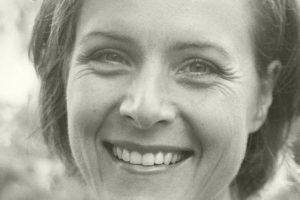
Q & A: Director Anna-Magdalena Fitzi On Her Approach To Coaching Singers And “Ottone” At Innsbruck’s Early Music Festival
By Alan NeilsonInnsbruck’s Early Music Festival is presenting Handel’s “Ottone” as its Barockoper: Jung production in which promising young talented singers who have just embarked upon their careers are given the opportunity to perform in a fully staged work.
The director for this production, Anna-Magdalena Fitzi seems the ideal choice to take charge of the staging as she works extensively with young singers at Schweizer Opernstudio of the Hochschule der Kunste Bern, coaching them in acting and language. She, however, is not a passive teacher. She brims with ideas, which focus on the relationship between singing and acting, with the result that her approach is innovative, exploratory and, moreover, encourages the singers to engage with their characters at a very deep and personal level.
Luckily, she was able to take time out from rehearsals to talk to Operawire about her technique and her thoughts about “Ottone,” in what proved to be very interesting and insightful interview.
Operawire: What motivated you to become an opera director?
Anna-Magdalena Fitzi: I grew up in Berlin. My parents were both involved in the theatre. So, I became an actress, after studying in Stuttgart and Liege, and I had a fairly normal career. I did not seriously consider opera at this point, and it was pure chance that I moved in this direction.
One day when I was working in Lubeck, I was staying in a house with a mezzo who was playing the role of Amneris in “Aida,” and she asked me to coach her. This was the first time I worked with a singer. It was very interesting because it was a difficult role to play because she had to get drunk, and was almost naked. As a way of thanking me she took me to an opera in Trieste in which she was singing. It was at this point that I realized that this was something I needed to discover; the music was drawing me in.
So I found myself positions as a staff producer; I worked as an acting coach with Benedikt von Peter, who has just now been appointed as the new managing director of Theater Basel for 2020-21, and with Christof Loy who brought me to Frankfurt Opera, where I became a full time assistant.
OW: Do you have any musical training?
AMF: Not formal training, but I have a musical background. I played the piano, I sang in choirs and have played in orchestras. So I read music and feel comfortable in a musical environment.
In Frankfurt the Artistic Director Bernd Loebe asked me to stage “Anne Frank’s Diaries,” a Mono-Opera for one Singer. So I started to develop a particular interest in the lyric actor, and although there are already many good performers, it was a very rewarding time discovering their potential. The whole body is involved in singing, and it is something you must use in developing your acting skills.
I did a lot of research on this subject, especially in my role as an acting and language coach for young singers at the Schweizer Opernstudio of the Hochschule der Kunste Berne .
OW: What is your research?
AMF: Singing is dependent upon the physical body. So, for example, if the you are suddenly surprised the whole body will react, and your breathing will change, which will affect the voice.
I want singers to allow their emotions to inform their singing through their breathing. Our emotions and the way we breathe are intimately intertwined, so I encourage singers not to separate their feelings from the breathing . I try to bring the emotions out of the body through the voice, using their breathing as a vehicle to achieve this. It is a way of freeing the voice, and I believe this brings more emotional truth to their singing.
I don’t want them to have a “perfect” voice because the audience wants to be touched by the emotions. Singers on stage consider what they should be doing while they are singing, but thinking is already acting, because our thoughts create emotions which cause the actions. I want the singers to approach their work so that their thoughts naturally bring them to do something; it is not for me to tell the singers to do this, do that.
OW: How does that research inform your directing?
AMF: For this production, I am working with a group of young singers and I am training them to approach their singing in this way, and they are very enthusiastic about the ideas.
What is special about working in a baroque opera is the da capo opera, with its ABA’ structure. It is a rhetorical idea, and for me the A part displays the awareness of the problem, part B is a secondary idea which contradicts or enlarges the problem which needs reflection, and then there is the solution, which is explored in the da capo section.
There is so much going on, I do not need to invent external actions, there is so much emotional conflict. This takes away the stress from the singer because they do not need to think about what to do in the six or eight minutes of the aria. There is only one thing that informs their actions and this is their self-reflection, as a consequence their actions become natural.
So I see my role as assisting the singer in discovering the emotional journey and the subtext of the character. I have an idea of the journey the character takes, but I allow them to express themselves in their own way. I want to meet the singer through their character, and it follows that two singers performing the same part will do it in a completely different way as their emotional responses will not be identical. It also means that a singer’s performance can change each evening depending upon their emotional state, although obviously the logistic aspects, such as entrances and exits, must remain constant. I believe that this is an honest way of portraying a character.
In trying to encourage singers to accept this approach it is obvious that some will take to it more so than others. If I see a singer under pressure, seeking perfection, wanting to perform like an athlete, with the meaning of the text only as secondary consideration, then they are not treating singing as an expression of themselves. It becomes external, outside of their own emotional state. I don’t feel it is honest, more like a circus act, but many singers are conditioned to act like this.
I have been very lucky with this cast. They understand my ideas, and have embraced them enthusiastically. They take risks and it is difficult for them because they are not used to working like this. They must also accept that this way of working will personally affect them.
OW: What are the themes you have identified in “Ottone?”
AMF: Everyone was telling me that “Ottone” is about politics and love, but this did not resonate with me. Where are the politics? What is interesting in “Ottone” is the conflict of emotions.
The piece is as relevant today as when Handel wrote the opera. We are not telling a story about historical characters, but about conflict and pain and how people deal with their emotions. Everyone has to learn to deal with their emotions otherwise you come to a point where you endanger yourself or other people. So it is about exploring the human condition outside of any era.
We have set the opera in a timeless hotel, over a period of 24 hours, in which all the guest are expecting a wedding. In the end, all the characters will have engaged with each other and it becomes a cathartic exercise.
At the beginning of the opera, when they arrive at the hotel they are all hiding behind masks, they are conditioned not to show their real self and their real emotions. They arrive, having following their own different paths. By the end, however, there is reconciliation of sorts and there is hope.
I would also like to say that there are no “bad” characters – every individual feels the need to act as they do. It is interesting to discover what drives them to behave in the way they do. I look at a character’s actions and try to understand the reasons that have motivated them.
The singer playing Gismonda said to me, “I am playing the evil woman,” but she isn’t: she has her own story, and her own needs. They motivate her behavior and we must understand this: she was the Queen, and she lost her husband, she has her own formative history. Like with all of us, there is weakness: in this case Gismonda cannot let go, she wants to hold on to her past. So we must reflect on the thoughts and the story which drives her emotions and her behaviour.
OW: Have you altered the libretto at all?
AMF: No, everything we stage is in the text, but we needed to shorten it, so we decided to simplify the story.
The focus is on the role of Teofane – she becomes a teacher. At the time in which the opera is set, Byzantinum, where she comes from, was highly sophisticated. Ottone comes from a more basic background. She witnesses the action with detachment. At a point when they are all ready to kill each other, Teofane brings them together and suggests they talk.
She is the only character who is able to do this because she alone reflects before acting, while all the other characters act on impulse, with the exception of Ottone who becomes increasingly helpless. Only Teofane has the rhetorical tools to bring people together. We did not add anything to the text, nor change the order, we only made a few cuts.
OW: So you see this as an opera which deals with modern day concerns?
AMF: At the beginning of the opera, the characters behave as they wish to be seen, and then everything spirals out of control, and they end up meeting themselves at a deeper emotional level, everyone is suffering and exhausted, not having slept. Their nerves are blank. Teofane intervenes and makes them sit down together.
It is a modern way of expressing emotions, or maybe timeless. People are egocentric and self-absorbed, and don’t think before they act. They act on impulse. We can see this all around us. Current rulers are egocentric, and we are dependent on their decisions!
OW: Going back to what you said about there being no evil or “bad” characters, does this make it more difficult to present a work?
AMF: I can sympathize with all the characters. I understand their motives. In “Ottone” we have six equally valid characters with different biographies. They have all been conditioned into the way they behave. From the start they are not free to behave the way they want. But by the end, after they have gone through this cathartic experience, they have the opportunity to make decisions and there is hope.



